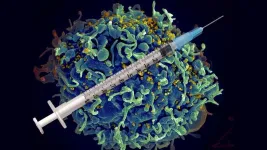(Press-News.org) Since it was identified in 1984 as the cause of Acquired Immune Deficiency Syndrome (AIDS), the human immunodeficiency virus (HIV) has infected more than 80 million people and been responsible for some 40 million deaths worldwide, according to the World Health Organization (WHO). Currently, the WHO reports more than 38 million people globally live with the retrovirus, and each year, another 1 million new cases are diagnosed. While antiretroviral therapy helps keep HIV in check, patients must stay on their medication to prevent the development of AIDS.
Scientists have spent years trying to develop an effective HIV vaccine, but none have proven successful. Based on findings from a recently published study, a Johns Hopkins Medicine-led research team may have put science one step closer to that goal.
Their work first appeared online April 14, 2023, in the Journal of Experimental Medicine, and will be formally published in the July 3, 2023, issue.
Using a laboratory technique created at Johns Hopkins Medicine in 2010, the study researchers replicated the cellular environment in which specialized immune cells called antigen presenting cells (APCs) break down proteins derived from HIV and make them visible (“presented”) to the immune system’s frontline of defense, cells known as CD4+ T lymphocytes, or helper T cells.
“Our simple method, called reductionist cell-free antigen processing, reproduces in a test tube the complex events that occur in the human immune system as a response to antigens, foreign invaders to the body such as viruses like HIV,” says senior study author Scheherazade Sadegh-Nasseri, Ph.D., professor of pathology at the Johns Hopkins University School of Medicine. “When APCs chew up proteins from an antigen and present the fragments, known as antigenic epitopes, on their surface, the epitopes become visible to helper T cells and initiate an immune response.”
“If we can identify which epitopes are ‘immunodominant’ — the ones that elicit the strongest immune system response to the virus — then we may have the essential ingredients for the long-sought recipe to make an effective HIV vaccine,” explains Sadegh-Nasseri.
Epitopes that are immunodominant have structures that uniquely fit like a lock and key with cell-surface proteins on APCs known as major histocompatibility molecules, or MHCs.
“If you think of an HIV epitope as a hot dog and the MHC as a bun, the ‘meal’ is what gets presented to CD4+ T cells,” says lead study author Srona Sengupta, an M.D./Ph.D. candidate in immunology at the Johns Hopkins University School of Medicine. “T cells that can recognize the HIV epitope-MHC complex as foreign become activated and signal B cells — a different type of immune cell that produces antibodies, in this case, specific to HIV. Antibodies bind to the virus, destroying already infected cells or preventing HIV from entering uninfected ones — the key functions of an effective vaccine.”
Sadegh-Nasseri says previous efforts to map and identify the desired immunodominant epitopes have proven unreliable.
“Traditional methods use a ‘brute-force’ system where synthetic peptides representing portions of real HIV proteins are tested in the hopes that some will stimulate an immune response and direct researchers to the epitopes needed for vaccine development,” says Sadegh-Nasseri. “Not only is this strategy hit or miss, but the method doesn’t allow for the real-world chemical and molecular interactions that can impact how epitopes are produced and function.”
This, she explains, is a major reason why an effective HIV vaccine remains elusive.
“Our cell-free antigen processing system,” says Sadegh-Nasseri, “replicates how epitopes are actually processed in the APC’s cellular environment and become presented, including any influencing factors that may come into play.”
“This enabled us to study nearly the entire HIV proteome [all of the proteins produced by the virus] and distinctly identify epitopes that are selected for presentation to CD4+ T cells by a chaperone protein called HLA-DM,” says Sengupta. “That’s important because we know that HIV epitopes processed and edited by HLA-DM are immunodominant.”
Sengupta adds that 35 epitopes identified in the recent studies were previously unknown.
The researchers say that their analysis using the cell-free antigen processing system revealed three important findings: (1) the epitopes identified are indeed generated in humans who are HIV positive and lead to the development of memory CD4+ T cells (the immune cells that remember an antigen for future encounters); (2) the processing system can be very useful in predicting which parts of HIV protein antigens may yield the immunodominant epitopes that can be included in new vaccines; and (3) the system’s use of full-length natural proteins ensures that the impacts of any cellular environmental influences (such as those causing modifications of viral epitopes after infected host cells have produced them) are taken into account.
Current analysis technologies lack such abilities, say Sadegh-Nasseri and Sengupta.
“Interestingly, we identified several epitopes that were modified by sugar groups, a potentially important finding for vaccine developers to know, but one that traditional analysis would have missed,” says Sengupta.
Sadegh-Nasseri and Sengupta say that their team will continue to refine the immunodominant epitope identification system and use the data from future analyses to enhance the ability of vaccine developers to design robust and effective protective measures against not only HIV, but also SARS-CoV-2 (the virus that causes COVID-19) and other viral pathogens.
Along with Sadegh-Nasseri and Sengupta, the members of the study team from Johns Hopkins Medicine and Johns Hopkins University are Nathan Board, Tatiana Boronina, Robert Cole, Madison Reed, Kevin Shenderov, co-senior author Robert Siliciano, Janet Siliciano, Andrew Timmons, Robin Welsh, Weiming Yang and Josephine Zhang. The team also includes Steven Deeks and Rebecca Hoh from the University of California San Francisco, and Aeryon Kim from Amgen Inc.
The study authors report no conflicts of interest.
END
Researchers use ‘natural’ system to identify proteins most useful for developing an effective HIV vaccine
Johns Hopkins Medicine-led team shows technique can find protein fragments that best stimulate the immune system to recognize and attack the virus
2023-05-30
ELSE PRESS RELEASES FROM THIS DATE:
Researchers identify link between alternative gene splicing and risk of alcohol use disorder
2023-05-30
INDIANAPOLIS—Researchers at Indiana University School of Medicine have discovered alternative gene splicing, which occurs during gene expression, can impact a person’s risk of alcohol use disorder (AUD). They recently published their findings in Molecular Psychiatry.
“AUD is a common and complex genetic disorder that happens people experience problems related to excessive alcohol consumption,” said Rudong Li, PhD, a postdoctoral fellow in the YunLong Liu, PhD Laboratory and lead author of the paper. “This discovery has revealed ...
Novel approach significantly improves access, decreases wait times for autism screening
2023-05-30
FOR IMMEDIATE RELEASE, May 30, 2023
Contact: Gina DiGravio, 617-358-7838, ginad@bu.edu
Novel Approach Significantly Improves Access, Decreases Wait Times for Autism Screening
Developmentally Trained-Primary Care Clinicians can reduce disparities for children referred for developmental evaluation
(Boston)—Autism spectrum disorder (ASD) is a neurodevelopmental disorder characterized by impairments in social communication and the presence of repetitive and restricted behaviors or interests. The American Academy of Pediatrics (AAP) recommends autism-specific screening at 18- and 24-month well-child visits, yet earlier diagnosis has been shown to ...
Illinois professor examines lasting legacy of al-Andalus for Arabs, Muslims today
2023-05-30
CHAMPAIGN, Ill. — Before it was home to Spain and Portugal, much of the Iberian Peninsula was ruled by a succession of Islamic dynasties for almost 800 years during the Middle Ages. Known as al-Andalus, its influence is still reflected in art and politics today – not only in Spain and North Africa, but also in places far from the historical site of al-Andalus.
Eric Calderwood, a comparative and world literature professor at the University of Illinois Urbana-Champaign, wrote about that influence and how it is used to make sense of the present in his new book, “On Earth or in Poems: ...
Astronomers discover planets in NASA Kepler's final days of observations
2023-05-30
A team of astrophysicists and citizen scientists have identified what may be some of the last planets NASA’s retired Kepler space telescope observed during its nearly decade-long mission.
The trio of exoplanets – worlds beyond our solar system – are all between the size of Earth and Neptune and closely orbit their stars.
''These are fairly average planets in the grand scheme of Kepler observations,” said Elyse Incha, a senior at the University of Wisconsin-Madison. “But they’re exciting because Kepler observed them during its last few days of operations. It showcases just how good Kepler was at planet hunting, even at the end of its ...
Matthew Bailes, Duncan Lorimer and Maura McLaughlin receive the 2023 Shaw Prize in Astronomy
2023-05-30
The Shaw Prize in Astronomy 2023 is awarded in equal shares to Matthew Bailes, Director of the Australian Research Council (ARC) Centre of Excellence for Gravitational Wave Discovery, Duncan Lorimer, Professor and Interim Chair of Physics and Astronomy and Associate Dean for Research at Eberly College of Arts and Sciences at West Virginia University, USA and Maura McLaughlin, Eberly Family Distinguished Professor at the Department of Physics and Astronomy, West Virginia University, USA, for the discovery ...
Are pandemic lockdowns and vaccinations complements or substitutes? Lessons learned from COVID-19 should be considered in future pandemics
2023-05-30
Worldwide, one of the initial responses to the COVID-19 virus was locking down parts of the economy to reduce social interactions and the virus’s spread. Now, the development and production of vaccines have largely replaced broad lockdowns. In a new study that considered epidemiology and economics, researchers sought to determine how the arrival of vaccines should affect the duration and intensity of lockdown policies. They concluded that boosting the rate of vaccine use influences intensity and duration of lockdowns, depending on a variety of factors.
The study was conducted by researchers at Carnegie Mellon University (CMU), the International Institute for Applied Systems Analysis, ...
To boost health care teams’ effectiveness, integrate organizational sciences research with technology development
2023-05-30
Health care organizations today are caring for patients with increasingly complex needs and leveraging larger teams that include clinicians with diverse and specialized expertise. At the same time, high turnover and labor shortages mean that facilities frequently employ a more temporary and mobile workforce. In a new commentary, researchers point out that, as a result, “the structure of health care teams often defies decades of wisdom from team-design research about the conditions that support the best possible performance.”
The article was written ...
Reusable packaging revolution is close - experts say
2023-05-30
30 May 2023 - A detailed plan to transform product packaging and significantly cut plastic production and pollution has been developed by researchers.
The study comes as government representatives meet in Paris to negotiate a legally binding global plastics treaty with a mandate to end plastic pollution.
The research, published today by the University of Portsmouth’s Global Plastics Policy Centre, commissioned by the Break Free From Plastic movement, consolidates 320 articles and papers, plus 55 new interviews with reuse experts from around the world [1], to suggest a universal definition of reuse systems and, for the ...
Silent zoo tours can generate new perspectives on animals, study suggests
2023-05-30
Visiting zoos in silence can generate a range of novel experiences, helping people to connect to animals in a more intimate way and giving visits more gravitas, according to new research.
Experts ran special silent events at Paignton and Bristol zoos as part of a wider project on the auditory culture of zoos.
Visitors were better able to focus, concentrate and even meditate on specific animals and their behaviour, which sometimes fostered feelings of intimacy with and attachment to particular zoo animals.
The research, published in TRACE: Journal for Human-Animal Studies, was conducted by Professor Tom Rice, Dr Alexander Badman-King, Professor Sam ...
World leading health experts say aviation industry must act on cabin fumes as they launch new medical guidance
2023-05-30
A group of world leading health and scientific experts are calling on the aviation industry to take action to protect passengers and aircrew from dangerous cabin fumes which they say have led to a new emerging disease.
Led by former pilot and leading global aviation health researcher Dr Susan Michaelis, the specialists have released the first medical protocol of its kind to help treat those effected by contamination of the aircraft cabin breathing air supply and collect data on contamination events.
The International Fume Events Task Force, made up of 17 doctors, occupational health specialists, toxicologists, epidemiologists and aviation experts, have spent six years researching ...
LAST 30 PRESS RELEASES:
COVID-19 vaccination during pregnancy may help prevent preeclampsia
Menopausal hormone therapy not linked to increased risk of death
Chronic shortage of family doctors in England, reveals BMJ analysis
Booster jabs reduce the risks of COVID-19 deaths, study finds
Screening increases survival rate for stage IV breast cancer by 60%
ACC announces inaugural fellow for the Thad and Gerry Waites Rural Cardiovascular Research Fellowship
University of Oklahoma researchers develop durable hybrid materials for faster radiation detection
Medicaid disenrollment spikes at age 19, study finds
Turning agricultural waste into advanced materials: Review highlights how torrefaction could power a sustainable carbon future
New study warns emerging pollutants in livestock and aquaculture waste may threaten ecosystems and public health
Integrated rice–aquatic farming systems may hold the key to smarter nitrogen use and lower agricultural emissions
Hope for global banana farming in genetic discovery
Mirror image pheromones help beetles swipe right
Prenatal lead exposure related to worse cognitive function in adults
Research alert: Understanding substance use across the full spectrum of sexual identity
Pekingese, Shih Tzu and Staffordshire Bull Terrier among twelve dog breeds at risk of serious breathing condition
Selected dog breeds with most breathing trouble identified in new study
Interplay of class and gender may influence social judgments differently between cultures
Pollen counts can be predicted by machine learning models using meteorological data with more than 80% accuracy even a week ahead, for both grass and birch tree pollen, which could be key in effective
Rewriting our understanding of early hominin dispersal to Eurasia
Rising simultaneous wildfire risk compromises international firefighting efforts
Honey bee "dance floors" can be accurately located with a new method, mapping where in the hive forager bees perform waggle dances to signal the location of pollen and nectar for their nestmates
Exercise and nutritional drinks can reduce the need for care in dementia
Michelson Medical Research Foundation awards $750,000 to rising immunology leaders
SfN announces Early Career Policy Ambassadors Class of 2026
Spiritual practices strongly associated with reduced risk for hazardous alcohol and drug use
Novel vaccine protects against C. diff disease and recurrence
An “electrical” circadian clock balances growth between shoots and roots
Largest study of rare skin cancer in Mexican patients shows its more complex than previously thought
Colonists dredged away Sydney’s natural oyster reefs. Now science knows how best to restore them.
[Press-News.org] Researchers use ‘natural’ system to identify proteins most useful for developing an effective HIV vaccineJohns Hopkins Medicine-led team shows technique can find protein fragments that best stimulate the immune system to recognize and attack the virus



